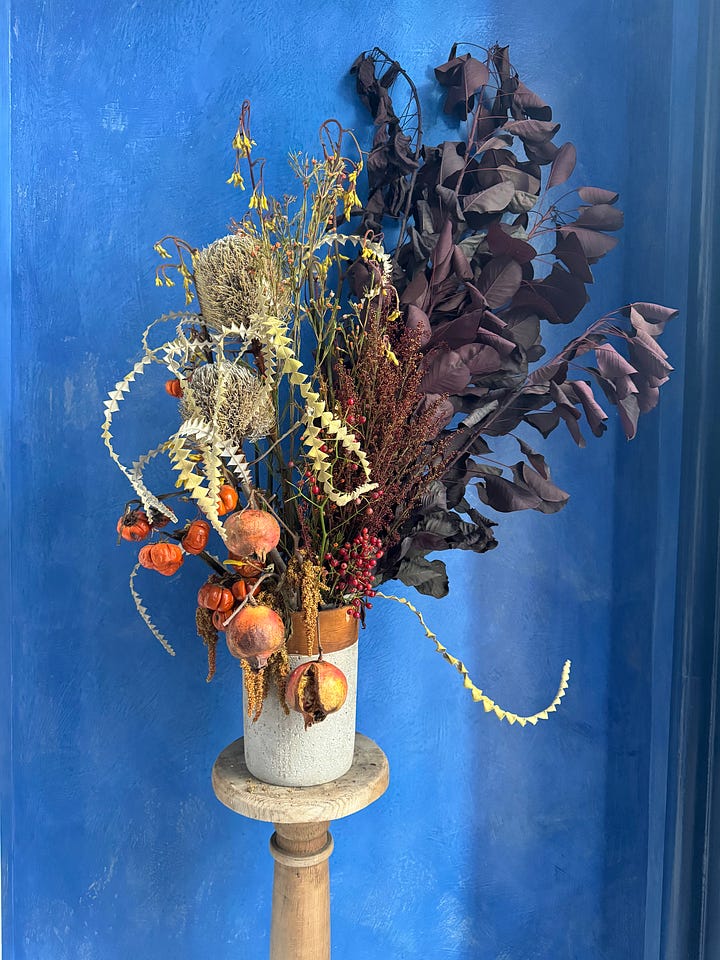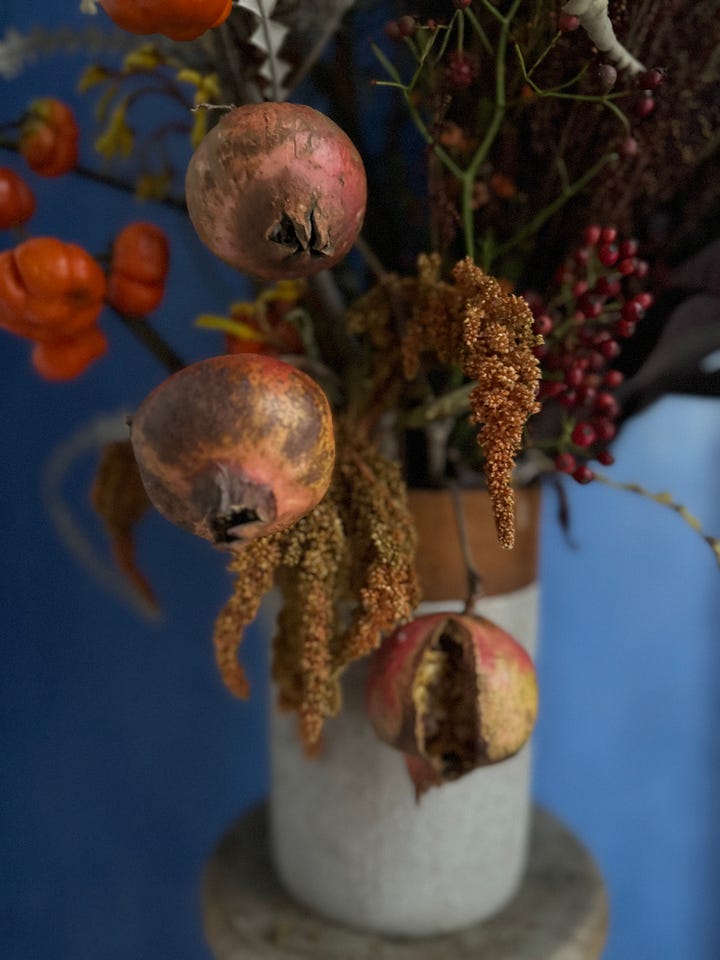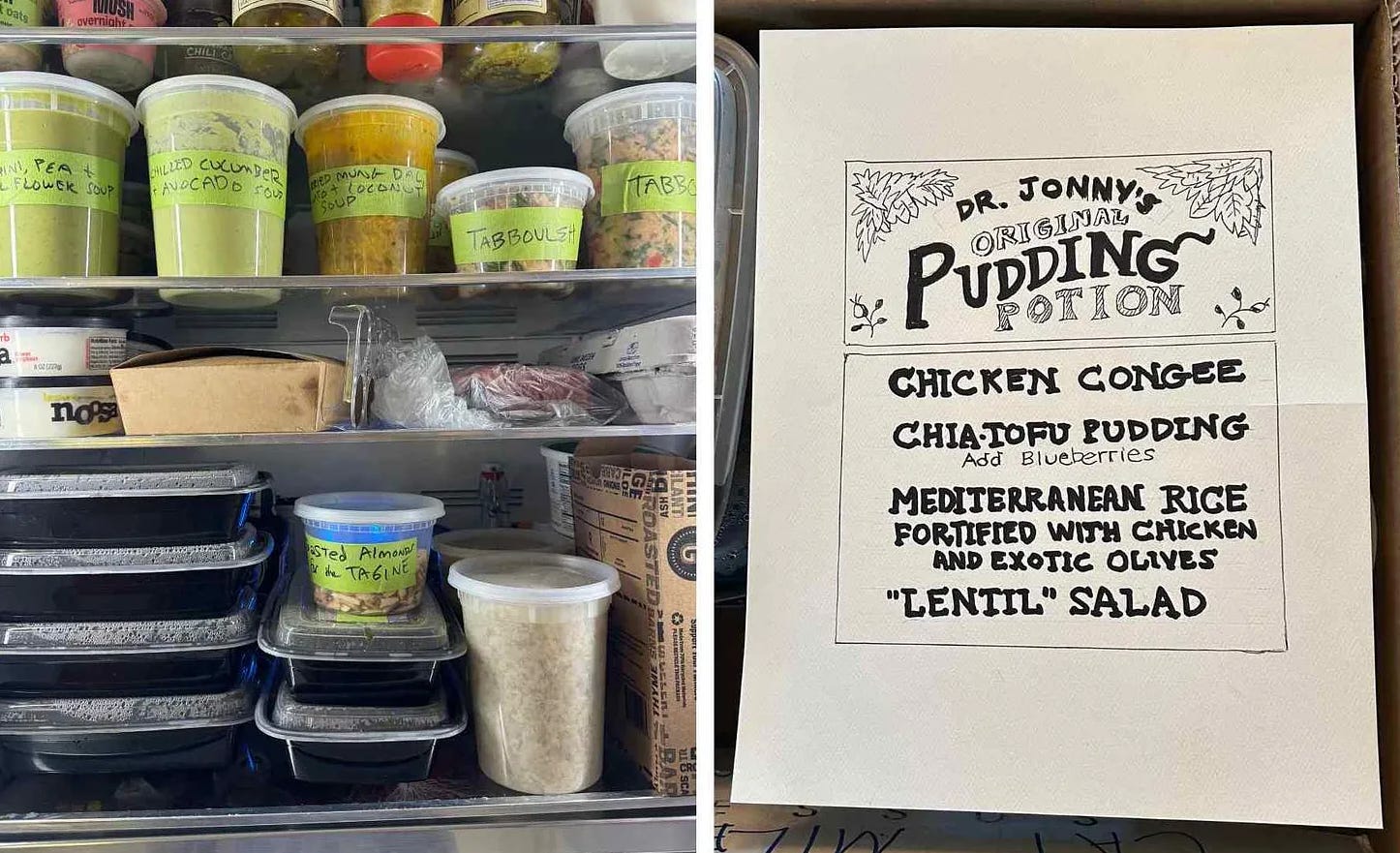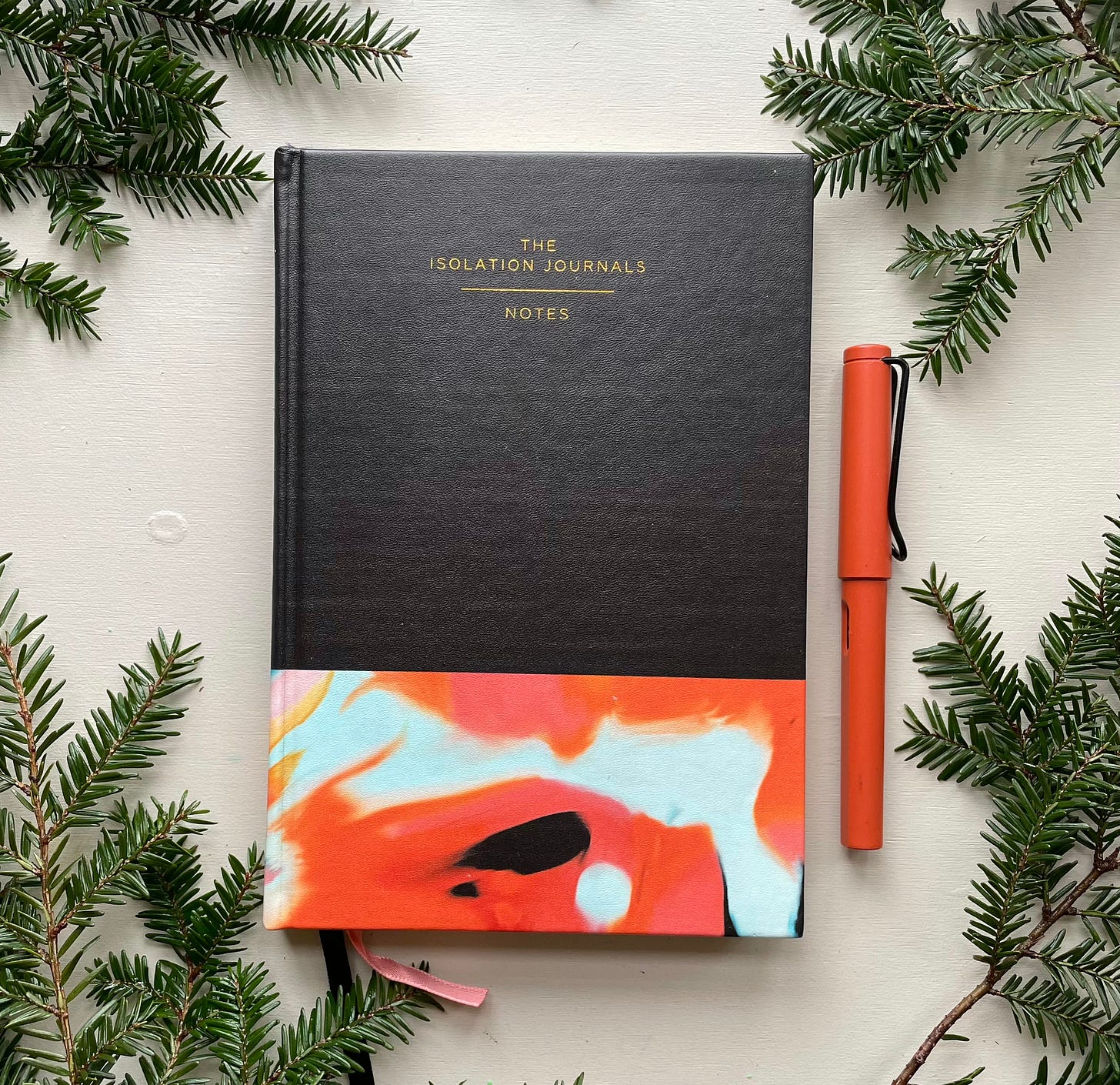

Hi friend,
I’m penning this newsletter a few days early this week, before I take some much-needed time off for Thanksgiving—a beloved holiday for some and a fraught one for many, but one that didn’t play a big role for me culturally. My parents being immigrants, we didn’t typically celebrate Thanksgiving when I was young. Instead, our family tradition was to go to Montreal, a three-hour drive from where we lived in upstate New York. We’d get a room somewhere like the Holiday Inn, and my brother and I would get to stay in and order pizza and watch shows we weren’t supposed to while my parents went out to dinner. Our regular diet was all whole-grain breads, home-brewed kombucha, and sugar-free sweets made with carob, and we didn’t have cable television at home, so pizza and The Jerry Springer Show was a monumental treat.
Yet sharing a meal was an important organizing principle and structure of our family. Every evening, we had a sit-down dinner, the fare homemade and seasonal, the table arrayed with colorful Tunisian dishware, cloth napkins, and candles. No matter what happened that day, no matter your mood, you came as you were and shared in a ritual of togetherness. It was an anchor, a moment to pause, to be present with people you loved, to be nourished physically and emotionally too. I adopted this ritual as my own in adulthood. I prepared a meal every evening for myself and whoever else was around, be it Jon or some friends, and the joy of making food was equal to the joy of eating it. Unlike my work—mostly projects that extend over weeks, months, and even years—a meal was a task I could see through from A to Z, and the smells, textures, colors, and flavors reignited my senses, getting me out of my head and back in my body.
But I stopped cooking when I relapsed three years ago, and I actually came to dread meals. Food didn’t taste good, and it made me feel ill. After my second bone marrow transplant, it was all I could do to consume enough calories to fuel my body and my recovery, and now that I’m doing chemo again, I’ve completely lost my appetite. More often than not, after I eat I have to take anti-nausea meds and retreat to bed—so I find myself tentative about eating even the blandest foods in the smallest portions.
The bright spot in this drab meal-time landscape is my friend Jonny’s weekly meal drop. It’s been such a joy for me, not because I can always eat the meals as I would like (i.e., overindulging, savoring every delicious, nourishing bite), but because it feels like an act of love to be fed in this way. Jonny is an incredible cook, but he also takes into account how I feel and what I need. One week all I could stomach was pudding, so he came up with a menu of savory and sweet varieties for me (see below for Dr. Jonny’s Original Pudding Potion prescription).
It’s also been a joy to share regular meals with Jonny and Cat (Jonny’s wife and one of my best friends). For the last few months, we’ve been having dinner together once a week. When we started this, they told me that I should feel free to get up and leave in the middle of dinner if I’m feeling tired or sick—or five minutes in, or before dinner even starts. They insisted that I don’t need to apologize or even say goodbye, and that makes it easy to say yes. I get to see them and fill my cup but in a way that feels manageable for me.
We gathered around the table just a few nights ago—me, Jon, Jonny, and Cat, along with my sweet friend Stacy, who was visiting from the city. It wasn’t a special occasion, just a Sunday dinner, but everyone pitched in, and there was such a warm buzz in the kitchen, as everyone worked together to get things to the table. Cat had snipped the last of the flowers in our garden and placed them in a couple of small vases on the table, and we piped in music via the jazz station in New Orleans, WWOZ. Stacy made very dirty martinis using pickle juice, and though I could only manage a sip, it was new and exciting. Jonny made a beautiful dinner of polenta with roasted chicken and anchovy butter, and it was the rare occasion where I had an appetite and could enjoy every delicious bite.
In praising the sit-down dinner, I don’t mean to cast judgment on fast food or take-out or other meals of convenience. Our lives are busy and there are only so many hours in the day, and you won’t believe how many times my dinner has arrived in the form of a protein shake in the last year. But I have found that when I don’t sit down for an evening meal, it’s as if there’s no anchor point to my day. I’m just rushing from one thing to the next, and food is a means to an end, rather than an opportunity to slow down, to conjure beauty, to step away from the phone, to take a moment to savor the first bite or the first sip, even if that’s all you can stomach.
Being fed by another feels like an act of love, especially when you’re struggling. That’s what moves me so much about the essay and prompt I have for you today, “More than Sustenance” by the food writer and cookbook author Jenny Rosenstrach. I first shared it a few years ago, yet it feels as timely as ever. May it remind us of the powerful role food plays in our lives, especially when shared with those we love.
Sending love & pudding,
Suleika
An item of note—
Mark your calendar! We’ve scheduled our next meeting of the Hatch, our virtual creative hour for paid subscribers, for Sunday, December 15 from 1-2 pm ET, with Holly Huitt hosting this time. (If you’d like a glimpse of what it’s like, check out the replay of last month’s gathering.) I hope you can join us!
Prompt 314. More than Sustenance by Jenny Rosenstrach
I got a text from my husband around 3:00 on a gray Wednesday in October. He was in his office. “Hospice called. I’m coming home now and will leave for Virginia soon after.”
Virginia was where he grew up, where his dad had been living, and living with Parkinson’s, for the past eight years. We had gotten this call a few times before, but that day, it felt more urgent. I cobbled together a babysitting plan for our two dogs—our kids are in college so that was taken care of—packed a duffel bag with some jeans and running clothes, then went to the kitchen to figure out some sort of meal for the road.
I write about food—specifically dinner—for a living, which might make it easier to understand why the spice mixture (cinnamon, cumin, smoked paprika, curry) that I had been planning to use on a skillet shrimp for dinner, was already mixed and waiting on the counter. I wondered if I should abort that plan and pack some peanut butter sandwiches. It seemed ridiculous to go ahead with this kind of recipe, to worry about spices and flavors, and even eating dinner, given what was happening. But it would only take fifteen minutes, so I started cooking—simmering water for five-minute couscous, sauteeing the shrimp in a little butter, tossing in the spices, then dolloping yogurt and packing it all up in to-go containers I’d saved from a deli. I stacked them in a Trader Joe’s shopping bag along with two cookies and a single cheap IPA for the passenger (i.e., me).
A few hours later, I found myself spoon-feeding my husband his shrimp dinner, making sure he had a little bit of everything in each bite, while he drove south on I-95. It was dark and starting to drizzle. We were almost in Delaware, the highway crammed with rush-hour traffic and trucks spewing exhaust. But “How Lucky Can One Man Get,” the famous John Prine song, was playing, and I weirdly felt a rush of gratitude. It wouldn’t be an easy weekend; my father-in-law would die three days later. But in that exact moment, with that song playing, and that undeniably delicious shrimp and couscous dinner, I felt privileged to be there, doing my small part to take care of the caretaker.
That night, and countless other times, cooking made me feel useful, in control when things decidedly weren’t.
Your prompt for the week:
When has cooking, or food in general, meant more to you than just sustenance?
If you’d like, you can post your response to today’s prompt in the comments section, in our Facebook group, or on Instagram by tagging @theisolationjournals. As a reminder, we love seeing your work inspired by the Isolation Journals, but to preserve this as a community space, we request no promotion of outside projects.
Today’s Contributor—
Jenny Rosenstrach is a food writer and cookbook author. Her New York Times bestselling book, The Weekday Vegetarians, is about a vow she and her family made that goes like this: Eat less meat, sort of. You can find her work on various national publications, including NPR, Real Simple, and Bon Appétit, where she was a columnist for seven years, and in her newsletter Dinner: A Love Story.
For more paid subscriber benefits, see—
Asking for What We Need, a video replay of my Studio Visit with the brilliant multi-hyphenate Lena Dunham, where we talked about the spiritual dividends of pain, self-advocacy, and the joyous liberation of a cancelled plan
On Unsolicited Advice, an installment of Dear Susu where I answer a question from a concerned dad surprised by his son’s resistance to wise counsel—and the community weighs in too
Letters from Love, a replay of one of the most profound experiences of my life—our workshop with my beloved friend Elizabeth Gilbert, where she shares the spiritual practice she uses to combat self-criticism and to access an ocean of unconditional love
Our Isolation Journal No. 1—
If you’re looking for a gift for a loved one this holiday season, consider our custom journal! We designed it with all our favorite features: it’s the perfect size to tote around, has ink-bleed proof paper and numbered pages for easy indexing—and for extra inspiration, we printed our Isolation Journals manifesto on the flyleaf. Get yours by clicking below!














In 2016 I was visiting Ramallah, Palestine. Each day I would walk from where I was sleeping about a mile to the old part of the city. There was a very distinct feeling of arriving into the older quarters of this city. As I turned up a narrow street, I would pass early morning pita-making shops. Then I would pass my favorite tiny falafel cafe. Whenever I ate there, usually mid-day, the owner, the only person working in this very small cafe, would prepare a dish of hummus and falafel, with pita. I loved watching this man take such quiet pride in preparing the meal. He would finish by skill-fully swishing a twirl of olive oil and a dash of green petals onto the dish. Usually I was the only person in the cafe at that hour. Yet, the owner showed such care in preparing and presenting his food. I felt so welcome, my visit so appreciated. We could easily have been family. 🏮
What a beautiful post. For me, cooking Thanksgiving dinner is about taking back a holiday and caring for my family. Days after my daughter was born (weeks early) we were rushing her back to the hospital. We spent that Thanksgiving at Children’s Hospital heating a plate of food in a microwave for families on our unit. Two years later we were once again in the hospital trying to figure out why my daughter was wasting away. We’d learned she had cystic fibrosis two months early but doctors suspected something else was going on too. It was a harrowing month long stay during which she almost died.
We found out she had celiac disease at a time when no one talked about gluten and finding stores or restaurants that could accommodate a gluten-free diet was extremely difficult (pre-smartphone, barely an internet).
Thanksgiving was a landline of foods that would sicken my daughter so I taught myself how to make the entire meal GF and delicious and started hosting every year. It’s a meal that for me represents nurturing her and the joy of being together at home.